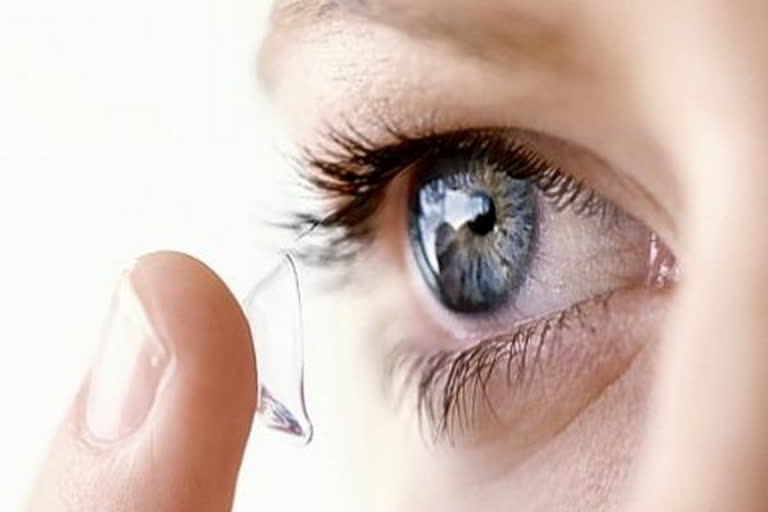New Delhi: People using contact lens are prone to Covid-19 infection leading to blindness and corneal transplants, said a research study compiled by Indian Journal of Medical Research (IJMR) on Thursday.
IJMR is one of the oldest medical journal published by the Indian Council of Medical Research (ICMR). Contact lens-related microbial keratitis is the infection of the cornea of the eye where the lens rests.
"It is a complex multifactorial disease. Although the absolute rate of such infections is low among contact lens users, the risk may be enhanced in a hospital setting with increased exposure to pathogenic organisms," the study said.
It said that the infections can lead to serious complications including blindness and need for corneal transplants.
"The colour surface of the eye is connected to the respiratory tract via the nasolacrimal duct. This would allow the virus to spread to the respiratory tract from the eye," the study said.
Air-borne droplets can easily infect the exposed ocular surface. "Certain strain of Coronavirus can cause a variety of ocular complications in both animals and humans. The possibility that SARS-CoV-2 can also infect the ocular tissue cannot be ruled out," it said.
Reports suggest that there are 1 million contact lens users in India and the number is growing at 15-20 percent a year. There are around 140 million contact lens users in the world.
The novel coronavirus has been detected in the tears and conjunctival epithelium of SARS-CoV-2 positive patients.
"However, the transmission rate from ocular tissue is suggested to be low. The frequency of conjunctivitis in patients with Covid-19 is estimated to be <3 percent. Droplet transmission occurs from Covid patients with respiratory symptoms, this increase the risk of health care worker (HCWs) of having their mucosa (nose and mouth) and conjunctiva exposed to potentially infective respiratory droplets in clinical settings," the study said.
Also Read: ICMR study suggests change in HCQ regimen for healthcare workers
The risk for contact lens-related infections includes non-modifiable factors such as younger lens wearers, male sex, high refractive error, higher socio-economic status and previous ocular disease.
The modifiable risk factors are smoking, overnight use of lenses, use of water as a solution to disinfect lenses, poor lens and hand hygiene as these causes increased bioburden production over lenses, the study said.
However, as of now, there is no study done to look at the current contact lens solution and SARS-CoV-2 disinfection.
The study said that hand hygiene should also be followed before the application and removal of contact lenses.
Nosocomial spreads of SARS-CoV-2 has been a major concern for both patients and HCWs.
"In the increasing layers of personnel protective equipment (PPE) contact lens may be a liability as it requires extra care before and after use," the study said.
Eyeglasses are advised in busy clinical environments ad these are easier to clean with soap and water and dried with a paper towel, u like lenses which may need to be replaced or thoroughly disinfected.
The IJMR said that further research is required to investigate the transmission and infectivity of SARS-CoV-2 through ocular tissues and secretions, to ascertain the interaction of lens material with the virus and to determine which lens solution components will fully disinfect this new virus.
Also Read: People with comorbidities can witness post-COVID infections: Health Expert



